REPUBLICAN SCIENTIFIC AND PRACTICAL CONFERENCE CONFERENCE WITH INTERNATIONAL PARTICIPATION «LIFE AFTER COVID-19»
Views: 3264
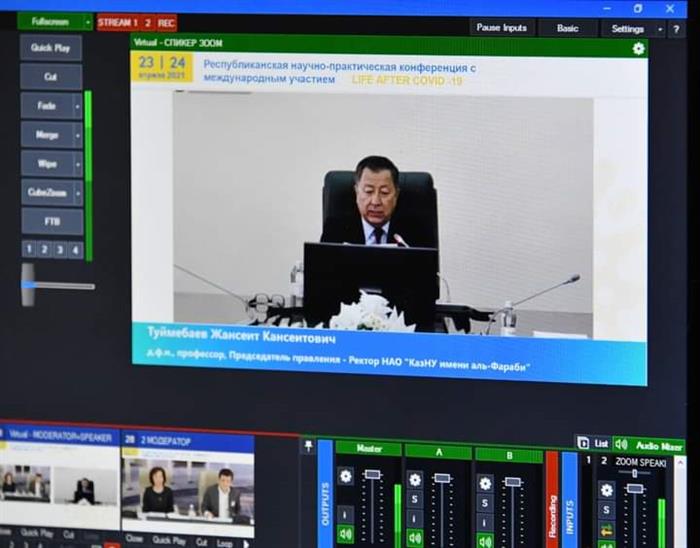 |
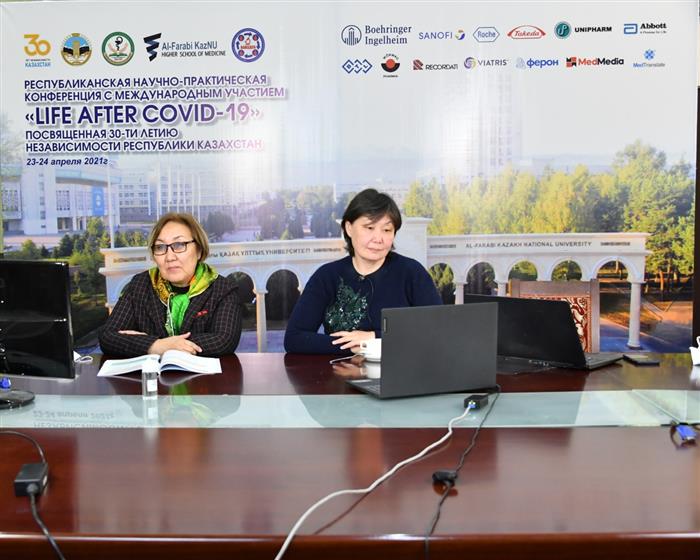 |
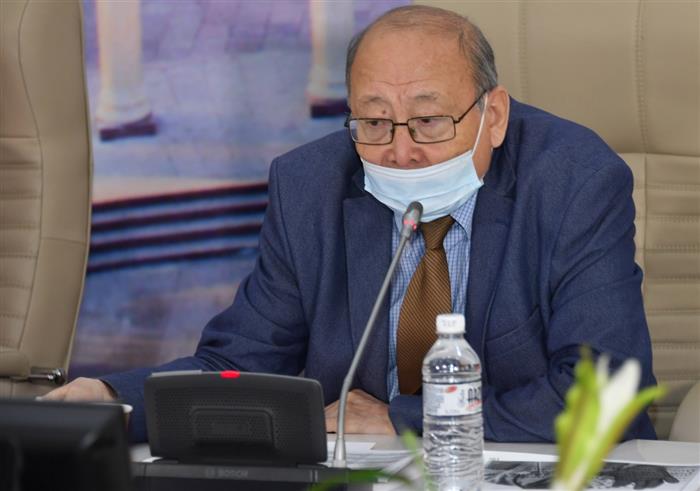 |
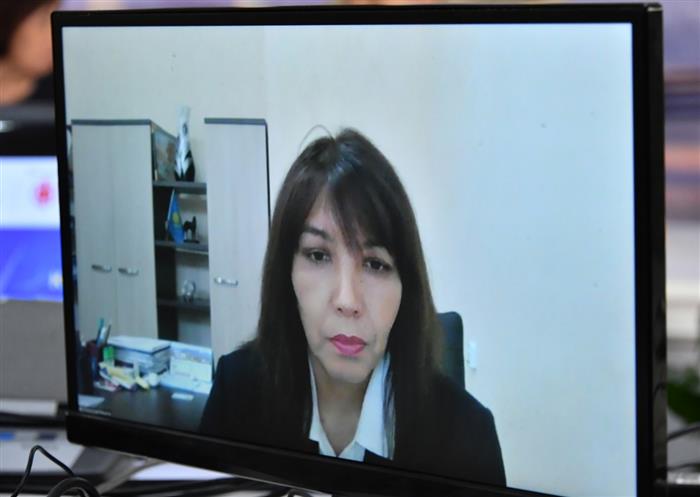 |
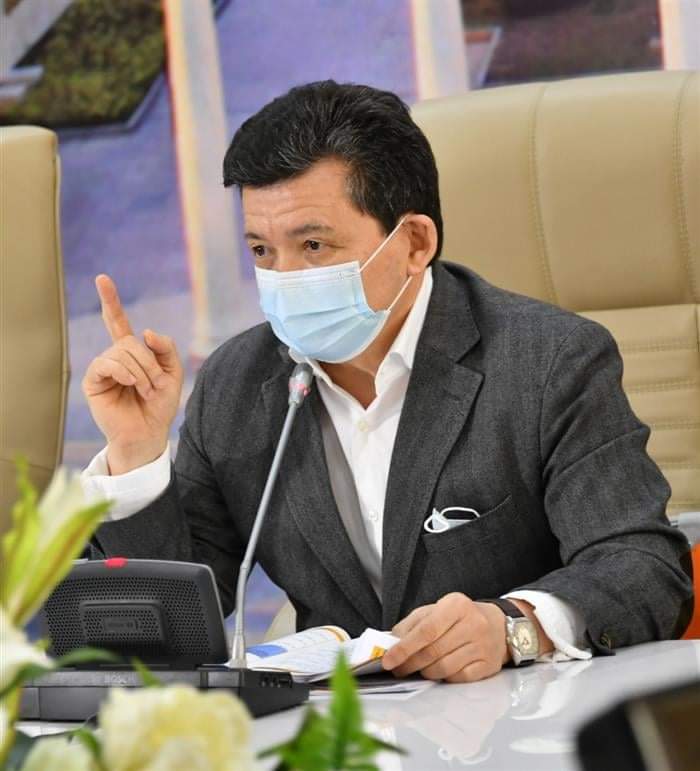 |
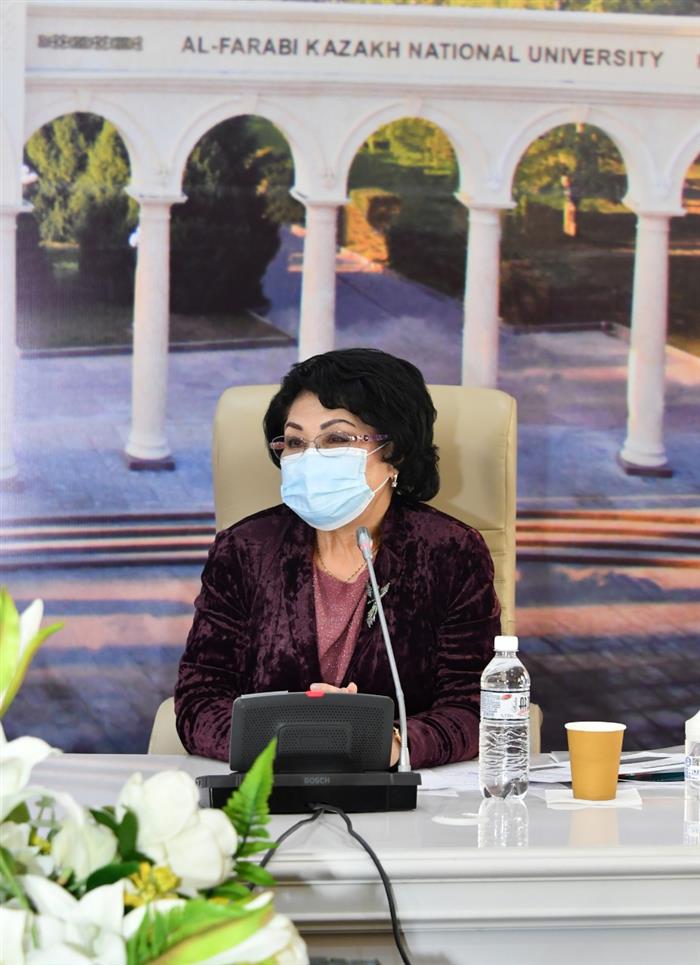 |
PRESS RELEASE of Republican scientific and practical conferencewith international participation "LIFE AFTER COVID-19",dedicated to the 30th anniversary of Independence of Kazakhstan
The Republican scientific and practical conference with international participation "LIFE AFTER COVID-19", dedicated to the 30th anniversary of the Independence of Kazakhstan, was held in Almaty in a distance format on April 23-24, 2021.The conference was organized by the Higher School of Medicine of the Faculty of Medicine and Health of the Al-Farabi Kazakh National University with the support of professional medical associations: the Association of Infectious Diseases Physicians of Kazakhstan, the Central Asian Association of Medical Laboratory Diagnostics and Expertise, the Kazakhstan National Association of Neurologists Neuroscience, the Association of Pulmonologists in Almaty, the Society of Specialists in Arterial Hypertension and Cardiovascular Prevention.Rector of the Al-Farabi Kazakh National University, Doctor of Philology, Professor Zhanseit K. Tuimebayev in his speech noted the efforts of the world community and the measures taken by our state to organize free vaccination against coronavirus for all citizens of the country. The rector stressed the importance of consolidating science, practical health care and laboratory services.The Dean of the Faculty of Medicine and Health of Al-Farabi KazNU, Doctor of Medical Sciences, Professor Zhanna A. Kalmatayeva and President of the Academy of Clinical and Fundamental Medicine of the Republic of Kazakhstan, Doctor of Medical Sciences, Academician of the National Academy of Sciences of the Republic of Kazakhstan, Professor of the Department of Phthisiopulmonology of S.D. Asfendiyarov KazNMU Talgat A. Muminov.For two days of the conference, there were 3537 connections from Kazakhstan, Russia, USA, Kyrgyzstan, Azerbaijan, Uzbekistan, Ukraine, Belarus, Georgia, India. 58 speeches were heard in 12 sections, including 31 reports were presented by foreign speakers. Among them are well-known scientists from the USA, Great Britain, Italy, Russia, Kyrgyzstan, Belarus, Israel, Lithuania, as well as leading Russian scientists. Among them are the Director of the Department of Drug Safety Research at the University of Southampton, Professor Saad Shakir (Great Britain), Associate Professor at Stanford University Vinicio A. de Jesus Perez (USA), Professor of the Cardiopulmonary Scientific University of Kent, Canterbury Gazvan Butros (Great Britain), Head of the Laboratory for Vaccine Prevention and Immunotherapy of Allergic Diseases of I.I. Mechnikov Research Institute of Vaccines and Serums, Doctor of Medical Sciences, Professor Mikhail P. Kostinov, Professor of the Peoples' Friendship University of Russia, Doctor of Biological Sciences Oksana A. Gizinger, Head of the Department of Immunology, Allergology and Immunotherapy of the Higher Medical School, Doctor of Medical Sciences, Professor Andrey P. Prodeus, Doctor of Medical Sciences, Professor, Corresponding Member of the Russian Academy of Sciences, Head of the Department of Clinical Biochemistry and Laboratory Diagnostics of the CM. Kirov Military Medical Academy, Vice-President of the Federation of Laboratory Medicine Andrei M. Ivanov, President of the National Society for the Study of Atherosclerosis (NOA), Doctor of Medical Sciences, Professor Marat V. Yezhov, Doctor of Medical Sciences, Professor of the Department of Pharmacology with Clinical Pharmacology of the Institute of State Medical Sciences, Institute of Trace Elements of UNESCO Olga A.Gromova, Professor, Doctor of Medical Sciences, Director of the Asuta Clinic (Israel) Evgeniy Moshkovich, professor, doctor of medical sciences, director of the N.I. Pirogov clinic (Russia) Vadim S.Zhuk, Doctor of Medical Sciences, Professor of the Department of Emergency Therapy of Postgraduate Education of Novosibirsk State Medical University (Novosibirsk, Russia) Olga N. Miller, Head of the Laboratory of Microorganism Genetics of N.I. Vavilov Institute of General Genetics of the Russian Academy of Sciences (Moscow, Russia) Doctor of Biological Sciences, Professor Valery N. Danilenko, Deputy Chief Physician for Rehabilitation of the Clinical Hospital "Lapino", Doctor of Medical Sciences Elena S. Silantyeva, Head of the Department of Obstetrics and Gynecology, FDPO "PIMU" (Nizhny Novgorod, Russia ), Doctor of Medicine, Professor Nadezhda Y.Katkova, Head of the Department of Pediatric Rheumatology, Research Institute of Rheumatology, Doctor of Medicine Irina P. Nikishina, Doctor of Medical Sciences, Professor of the Department of Hospital Pediatrics, St. Petersburg State Pediatric Medical University Mikhail M.Kostik, Director of the Department Cardiovascular Imaging of the Monzino Center for Cardiology (Italy) Gianluca Pontone, Doctor of Biological Sciences, Professor of the Russian Academy of Sciences Karen Karenovich Kyureghian (Russia), Doctor of Medicine, PhD, Director for Relations with Non-Governmental Organizations and Health Development Wim Vam der Helm.Within the framework of the conference, on April 23, 2021, under the auspices of the European Academy of Neurology (EAN), an EAN-day was held in Kazakhstan - the International Neurological Educational Forum "Neurology Update in Kazakhstan".At the plenary session “COVID-19. Global Challenge to Humanity” were presented reports on the features of epidemiology, immunopathogenesis, clinical picture, therapy; possible pulmonary vascular and neurological complications; multi-inflammatory syndrome, monitoring the post-authorization safety of vaccines.In the section “Epidemiology and diagnosis of COVID-19 infection. Vaccine prophylaxis” and the satellite symposium “Serological solutions for SARS-CoV-2 and their importance” were discussed the questions of the status and testing strategy of COVID-19 in the Republic of Kazakhstan preparation. In the presentation of the Head of DSEK for the city of Almaty, candidate of medical sciences Zh.M. Bekshin, it was noted that the use of rapid tests for the SARSCoV-19 virus antigen will provide dynamic surveillance, ensure the effectiveness of quarantine measures, as well as conduct mass testing and determine the effectiveness of vaccination. The problems of the rational organization of laboratory flows for express testing, the introduction of new methods into laboratory practice, the analysis of laboratory algorithms and the results of the diagnosis of COVID-19 were discussed. Fundamental and applied aspects of laboratory technologies in the diagnosis of COVID-19 and their rational use were highlighted in the report by the Vice-President of the Federation of Laboratory Medicine of the Russian Federation A.M. Ivanov. The result of the meeting was a recommendation to include in the Resolution of the Chief State Sanitary Doctor dated 25.12.2020 No. 67 "On further strengthening measures to prevent coronavirus infection among the population of the Republic of Kazakhstan" in the part "Express testing for COVID-19 is performed by the method of immunochromatography based on the principles of enzyme immunoassay. analysis (ELISA) with the determination of IgG / IgM antibodies to the SARS-CoV-2 coronavirus addition "and virus antigens of the SARS-CoV-2"; when developing regulatory documents on COVID-19, it is necessary to include in the list of laboratory diagnostic methods rapid testing for SARS-CoV-2 virus antigens, taking into account the place and level of medical care provided or anti-epidemic measures; conducting comparative studies of the effectiveness of COVID-19 diagnostic methods for the final development of a testing algorithm in the system of providing medical care to the population of the Republic of Kazakhstan and a unified National Strategy for Testing the Population for COVID-19.In the section “COVID-19: immunopathological aspects, clinic, complications, therapy. PostCOVID Syndrome” was presented by prof. K.B. Kurmanova, which highlights the properties of the newest variant of the (British) coronavirus, characterized by a more pronounced tropism with ACE2 receptors, which causes the predominance of neutrotropicity and thromboembolic disorders; as well as clinical manifestations of Long / PostCOVID, the key pathomorphological syndrome of which is endothelial dysfunction with the development of multi-inflammatory syndrome (MIS), which causes multiple organ pathology and reactivation of chronic diseases. In the report of prof. M.P. Kostinov, it was noted that the consequences of coronavirus infection are characterized by lesions of the bronchopulmonary, cardiovascular, nervous systems; On the basis of modern results on the immunopathogenesis of SARS-CoV-2, possible ways of immunorehabilitation using enzyme therapy and modern vaccines against respiratory infections have been proposed.Among the possibilities of pathogenetic therapy for COVID-19, the role of interferon therapy is indicated. According to prof. T.V. Kosenkov, in the early stage (viremia) interferon deficiency is expressed, in the absence of timely administration of interferon, the prognosis for lung damage is aggravated, the risk of death increases. The use of statins in patients with comorbidity (with lesions of the CVS, AH) and patients over 60 years of age, with the correct selection, reduce mortality by 30%, noted prof. M.V. Yezhov. In the report of prof. A.V. Naumov, data are given that vitamin D is able to inhibit the development of fibrosis in the lungs and tissues, the risk of hospitalization is reduced by 10% or more, the recommended doses of the drug are given. Taking into account the accumulated scientific data on the role of vitamin D in the complex therapy of COVID-19, the drug is recommended and has already been introduced into a number of Clinical Protocols.Multi-inflammatory syndrome and the treatment of comorbid pathology in PostCOVID syndrome were covered in more detail in the relevant sections "Cardiovascular diseases during the COVID-19 pandemic", "Pulmonological problems of COVID-19", "Mother and Child: issues of COVID-19", "Multi-inflammatory syndrome in children - a special immune response of the child's body to SARS-Cov-2?"Broadcast recordings are available at https://kaznumedconf.kz/webinars/Prof. G.M. Kurmanova noted, that the deviation of the immune response to SARS-CoV-2 in acute COVID-19 is characterised: instead of a high level of interferons and activation of natural killer cells, excessive activation apoptosis of lymphocytes and hyperproduction of proinflammatory cytokines are observed, correlating with the severity of the course. The levels of production of acute phase proteins in the acute COVID-19 exceed the levels characteristic of even severe bacterial sepsis.As noted by prof. M.M. Kostik, the inflammatory response in MIS differs from the cytokine storm of severe acute COVID-19, however, shares several similarities with Kawasaki disease, but also differs from this condition with respect to T-cell subpopulations, IL-17A, and biomarkers associated with arterial damage.In any epidemic, people usually experience stress and anxiety. The reactions of people affected by the epidemic, both directly and indirectly, are varied. But there are specific stress factors characteristic of the COVID-19 outbreak that affect the population - this is the fear of dying, avoiding medical care due to the fear of getting infected in a hospital; Social stigma and discrimination can be associated with COVID-19, including against infected people, their families, and healthcare workers and other professionals who provide direct care to those affected by COVID-19. Several aspects of this complex topic were discussed in the section “COVID-19. Psychoneurological aspects and rehabilitation”. Neurological symptoms and syndromes (anosmia, ageusia and other specific signs of covid) were presented by prof. L. B. Kuanova, clinical approaches to the therapy of such patients were reported by Z.B. Akhmetzhanova.There is a large body of research currently underway looking at mental disorders associated with COVID-19. These studies concern various segments of the population, starting with doctors and medical personnel, who are at the forefront of the fight against a dangerous infectious disease, to the general population, which, under conditions of quarantine measures, is constantly in fear of infection and financial losses. But COVID-19 itself can cause serious mental health problems. Professor Natalya I. Raspopova reported on the studies that are currently being carried out in Kazakhstan in this direction.Cognitive disorders occupy a significant place among the mental disorders associated with COVID-19. Cognitive deficit is most often associated with hemodynamic disorders in the central nervous system, the risk of which increases sharply in connection with stressful events. For the second year already, due to the COVID-19 pandemic, the population of the whole world is in a crisis, stressful situation, which necessitates the development of measures to preserve the cognitive reserve. About what measures should be taken in this regard, prof. Mira K..Tundybaeva.Current worldwide research related to the COVID-19 pandemic provides strong evidence that restrictive quarantine measures, school changes, stressful events in the family and parental responses to them have an adverse impact on children's mental health and adolescents whose personality formation is currently taking place in crisis conditions. All of this threatens the mental health of an entire generation. The options for acute reactions to stress in children in an emergency situation were reported by prof. Korlan Z.Saduakasova.The next series of reports in the section "PostCOVID Syndrome: Rehabilitation Issues" was devoted to modern approaches to the rehabilitation of patients who have undergone coronavirus infection.The role of the microbiome as a source of drugs for the prevention and treatment of COVID-19 was presented by prof. Valery Nikolaevich Danilenko. It was noted in the report that preparations based on the pharmabiotic Lactobacillus fermentum U-21 and bifidobacteria have antioxidant activity, minimize the cytokine "storm" and oxidative stress; given the low efficiency of protein vaccines, lacto- and bifidobacteria can be used as adjuvants that enhance cellular immunity.Dysfunction of the immune system during coronavirus infection is associated with a deficiency of interleukin-2. The effectiveness of the use of cytokine therapy (Roncoleukin) in severe pneumonia associated with COVID-19 was reported by prof. O. A. Giesinger.Prof. E.S. Silantyeva noted in her speech the role of physical factors (high-intensity focused electromagnetic field) in rehabilitation measures that allow non-invasively stimulate the respiratory muscles, increase blood circulation and trophism, which has a beneficial effect on cognitive indicators.The problem of obesity, diabetes mellitus, hypertensive conditions, which are risk factors for a severe course of coronavirus infection, was discussed in the section "Key aspects of the prevention of cardiovascular consequences of COVID-19."A wide range of clinical syndromes associated with acute COVID-19, as well as the consequences of the transferred infection in asymptomatic, mild, and even more moderate and severe forms, unequivocally raise the question of the most effective prevention - vaccine prophylaxis. Today, vaccination against coronavirus should be the key moment that can turn the tide with the pandemic.On April 24, 2021, a competition for young scientists was held. 12 poster reports were presented. The winners of the competition are:1st place - Makibaeva Makpal G. "The structure of heart lesions in children associated with SARS-CoV2" (MUA). Prize - 50,000 tenge.2nd place - Aleksandra V. Belyatko "Sleep quality of nurses working on the front line in the fight against COVID-19" (MUA). Prize - 30,000 tenge2nd place - Dzhaksybaeva Indira S. "Kawasaki-like syndrome in children in Kazakhstan after suffering COVID-19" (KazNMU). Prize - 30,000 tenge3rd place - Sabitova Vladlena R. "Analysis of the readiness of the healthcare system of the Republic of Kazakhstan for the outbreak of COVID-19" (ICC). Prize - 20,000 tenge.3rd place - Urstemova Kamshat K. "Results of the condition of newborns born from mothers with confirmed Covid-19" (KazNMU) Prize - 20,000 tenge.Nomination "For contribution to the fight against COVID-19" - Musagulova Zhanar Shakirzadakyzy "Multisystem inflammatory syndrome temporarily associated with SARS-CoV-2" (KazNU). Certificate 10000 tenge from ORDAMED ACADEMYNomination "For active discussion" - Rakhimbaeva Madina Sakenovna "The course of pregnancy, childbirth in women with confirmed Covid-19" (KazNU Al-Farabi). Certificate 10000 tenge from ORDAMED ACADEMYNomination "For the desire to win" - Shaimerdenova Gulbanu Ganikyzy "COVID-19 and pregnancy" (SKMA). Certificate in the amount of 10,000 tenge from ORDAMED ACADEMYNomination "Novice Scientist" - Omirzak Ainur Serikkyzy "The structure of the causes of deaths from COVID-19" (KazNU Al-Farabi). Prize - Certificate in the amount of 10,000 tenge by ORDAMED ACADEMYOn the conference website http://kaznumedconf.kz/ a virtual exhibition of equipment, medicines used for treatment, prevention, rehabilitation of patients was launched, in which more than 30 leading manufacturers of medicines and medical equipment took part.The Graduate School of Medicine expresses its gratitude to the Medmedia Congress Operator for technical support in holding the conference, as well as to the conference sponsors - Boehringer Ingelheim, Sanofi, Roche, Takeda, Unipharm, Abbott, BTL, Wörwag Pharma, Recordati, Viatris, Feron - actively participating in preparation of the scientific program of the conference, as well as the promotion of advanced technologies in the field of diagnosis, treatment, rehabilitation, prevention of COVID-19 associated pathological conditions and the dissemination of the latest interdisciplinary knowledge on the most important problem of our time.Consolidation of efforts on joint scientific research and implementation of the latest knowledge in epidemiology, laboratory diagnostics, immunopathogenesis, clinic, therapy, medical rehabilitation, vaccine prevention of COVID-19, as well as monitoring the safety of vaccines in practical health care is essential in the fight against the pandemic.
Recordings of all broadcasts are available at https://kaznumedconf.kz/webinars/until May 24, 2021
Until next time!
Press release prepared byDoctor of med. Sc. A.M. Kurmanova








